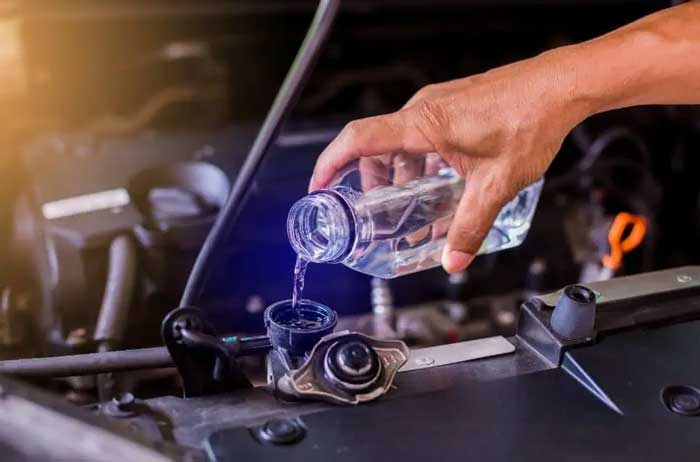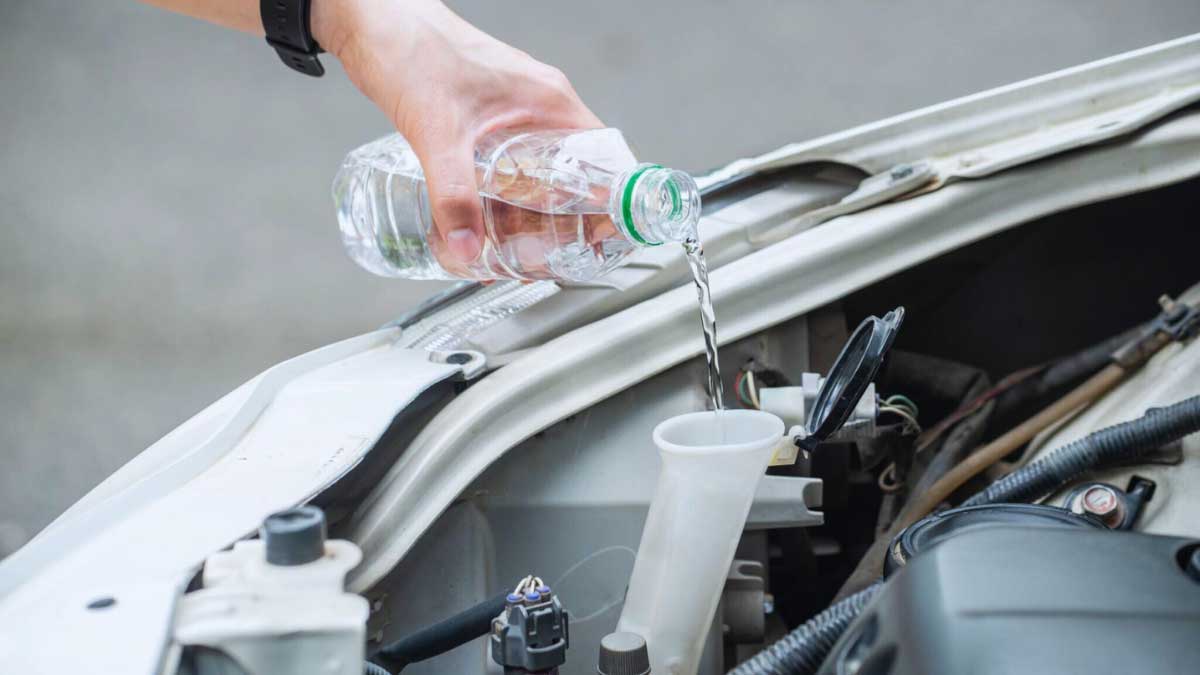So, picture this: you’re staring at your car’s coolant tank, pondering life’s big questions, like, “Can I just dump some good ol’ H2O in there and call it a day?” Well, my friend, buckle up because we’re about to jump into the wild world of coolant tanks and water.
I’m no rocket scientist, but I’ve had my fair share of adventures under the hood of a car. And let me tell you, the temptation to grab the nearest garden hose and top off that coolant tank with water is real. But before you go turning your ride into a mobile swimming pool, let’s uncover the truth behind this watery conundrum.
So, grab a cup of tea (or maybe some coolant, if that’s your thing), and join me on this journey to discover if water is a friend or foe when it comes to your car’s coolant tank.
Can You Put Water in Your Coolant Tank?
I must admit, the temptation to pour water into the coolant tank of your car can be strong. But before you grab that garden hose, let’s jump into whether water is truly a friend or foe for your vehicle’s cooling system.

When Is It Safe to Use Water?
I know what you’re thinking: “Water seems like a cheap and easy fix, right?” Well, not so fast! While topping off your coolant with water might be a quick solution in a pinch, it’s essential to use it under the right circumstances.
- Emergency Situations:
- If you’re stuck on the side of the road with an overheating engine and coolant is nowhere to be found, adding water can help bring down the temperature temporarily.
- Short-Term Use:
- In situations where a proper coolant mixture is unavailable, such as during a road trip, water can act as a temporary stopgap measure until you can get the correct coolant.
Potential Risks of Using Water as Coolant
Ah, the downside of taking the easy road! While water might seem like a convenient substitute, it comes with its fair share of risks and drawbacks.
- Corrosion Concerns:
- Water lacks the corrosion inhibitors present in coolant, making your engine vulnerable to rust and corrosion over time.
- Freezing Point Woes:
- During frigid winters, water-based coolant can freeze, potentially causing irreversible damage to your engine block.
- Boiling Point Blues:
- On scorching summer days, water alone may not be enough to prevent your engine from boiling over, leading to overheating issues.
How to Properly Add Water to Your Coolant Tank
Alright, let’s jump into the exciting world of adding water to your trusty coolant tank without causing a mini-disaster under the hood. Here’s my quirky yet informative guide to help you sail through this automotive adventure with ease.
Step-by-Step Guide to Adding Water
- Pop the Hood: Show that engine who’s boss by locating the coolant tank. It’s usually a semi-transparent container with “coolant” or “water only” marked on it. No Hogwarts map needed for this one!
- Check the Temperature: Make sure your engine has cooled down before attempting any shenanigans. We want to add water, not turn into a human steam generator!
- Open Sesame: Twist that cap counter-clockwise. Don’t worry; it’s not the genie’s lamp, but something equally magical – your car’s health.
- Pour Water: Time to get wet! Slowly pour water into the tank until you reach the “max” or “full” line. Precision is key; we aren’t watering the plants here!
- Cap it Off: Tighten that cap back up. Remember, lefty loosey, righty tidy. We’re sealing the deal, not making a mess.
- Check for Leaks: Give your car a quick once-over to ensure we haven’t inadvertently created a sprinkler system under the hood. We aim for a drip-free zone.
- Arctic Adventures: If you live where snowmen are your neighbors, opt for coolant over water. We don’t want any icy surprises ruining your morning commute.
- Hotter than Hot: In scorching climates, coolant keeps your engine from turning into a boiling cauldron. Water is great for hydration, not for engines in the desert!
- Anti-Corrosion Charm: Coolant plays superhero by protecting your engine from rust monsters that lurk in the shadows. Water may rustle some feathers, but coolant saves the day.
Effects of Water on Cooling System Components
Let’s jump into the long-term consequences of using water in your car’s cooling system:
Corrosion Potential
Water can promote corrosion within the cooling system due to its lack of corrosion inhibitors. This can lead to rust formation on metal components, potentially causing leaks and damage over time.
Prolonged Overheating
Water has a lower boiling point than coolant, making it less effective in maintaining optimal engine temperature. Using only water in the cooling system can lead to prolonged overheating issues, which may result in engine damage.
Scale Build-Up
Minerals present in tap water can cause scale build-up in the cooling system, particularly in the radiator and heater core. This build-up can restrict coolant flow, reducing the system’s efficiency and potentially causing overheating.
Freezing Risk
In cold weather, water in the cooling system can freeze, expanding and potentially cracking the components. This can result in costly repairs and a compromised cooling system.
Decreased Heat Transfer
Compared to coolant, water has lower heat transfer properties. Using water alone can reduce the cooling system’s efficiency, leading to inadequate heat dissipation and potential engine overheating.
Electrolysis Concerns
Water’s electrical conductivity can lead to electrolysis in the cooling system, causing damage to various components like the radiator, heater core, and water pump. This can accelerate corrosion and compromise the system’s overall performance.
Summary
While water may seem like a convenient alternative to coolant, its long-term effects on the cooling system components can be detrimental. From corrosion and overheating issues to scale build-up and freezing risks, using water alone can compromise your car’s engine health and overall performance. It’s essential to prioritize using the recommended coolant mixture to ensure optimal functioning and longevity of your vehicle’s cooling system.
Choosing the Right Type of Water for Your Coolant Tank
Ah, the age-old dilemma: what type of water should I pour into my coolant tank? Well, fear not, my friends, for I am here to guide you through this wet and wild decision-making process!
Different Types of Water:
- Tap Water: Your regular everyday tap water might seem like a convenient choice, but be cautious. It can contain impurities that could harm your cooling system over time. Think of it as a mischievous little gremlin that might cause trouble down the road.
- Distilled Water: Now, distilled water is like the angel of the water world – pure, clean, and free from contaminants. It’s the safest option for your coolant tank, ensuring that your engine stays happy and healthy without any unwanted surprises.
- Check the Label: Always read the label before buying water for your coolant tank. Look for words like “distilled” to ensure you’re getting the good stuff.
- Avoid Mineral Water: While we humans might enjoy a refreshing bottle of mineral water, your car’s cooling system won’t feel the same way. The minerals in it can cause buildup and lead to potential issues.
- Go for Distilled: When in doubt, go for distilled water. It’s like giving your engine a refreshing drink that will keep it running smoothly and efficiently.
Alternatives to Water in Emergency Situations
So, you find yourself in a pickle with an overheating car, and you’re wondering, “Can I put water in the coolant tank?” Well, while water can work in a pinch, there are some alternatives that might be even better. Here are some options to consider:
Antifreeze
If you’re facing a coolant emergency, consider using antifreeze instead of water. Antifreeze is specially formulated to withstand extreme temperatures and protect your engine against freezing and overheating. Just make sure to dilute it according to the manufacturer’s instructions to get the best results.
Coolant Additives
Another alternative to water is coolant additives. These products are designed to enhance the performance of your coolant, improve heat transfer, and prevent corrosion in your cooling system. Plus, they often come in convenient liquid or powder forms that are easy to use.
Engine Ice
For those looking for a high-performance solution, engine ice is a top choice. Engine ice coolant is specifically engineered to reduce operating temperatures and keep your engine running cool even under the most demanding conditions. It’s a bit pricier than traditional coolant, but the benefits are worth it.
Hybrid Coolants
If you want the best of both worlds, hybrid coolants might be the answer. These innovative products combine the benefits of traditional coolant with the added cooling power of water wetter. Hybrid coolants are designed to improve heat transfer and protect your engine from overheating, making them a great option for performance-minded drivers.
To conclude, while water can be a temporary fix, there are several alternatives that offer better performance and protection for your engine. Whether you opt for antifreeze, coolant additives, engine ice, or hybrid coolants, choosing the right option can help keep your engine cool and running smoothly in any situation.
Conclusion
So, there you have it! Water in the coolant tank might seem like a quick fix, but it’s like putting a band-aid on a broken bone. Remember, your car’s engine deserves better than a DIY science experiment. Opt for the right coolant alternatives to keep your engine purring like a contented kitten. Whether it’s antifreeze, engine ice, or hybrid coolants, there’s a whole buffet of options to choose from. So, next time you’re tempted to grab that garden hose, just think about your engine silently weeping in the corner. Show it some love and give it the coolant it deserves. Your car will thank you with many more miles of happy motoring!
Can I use water instead of coolant in my car’s cooling system?
Using water instead of coolant can lead to mineral buildup, corrosion, and inefficiency. It is recommended to use distilled water if necessary but using a proper coolant is essential for optimal engine performance and longevity.
What are the risks of using water in a car’s cooling system?
Water in a car’s cooling system can cause corrosion, mineral deposit development, and wear on the system, leading to potential engine damage. It is best to avoid using water as a replacement for coolant to prevent these issues.
Are there alternatives to water for emergency situations in a car’s cooling system?
Yes, there are alternatives to water in emergency situations such as antifreeze, coolant additives, engine ice, and hybrid coolants. These alternatives provide better performance, heat transfer, corrosion prevention, and engine protection compared to water, ensuring the engine runs cool even under demanding conditions.

